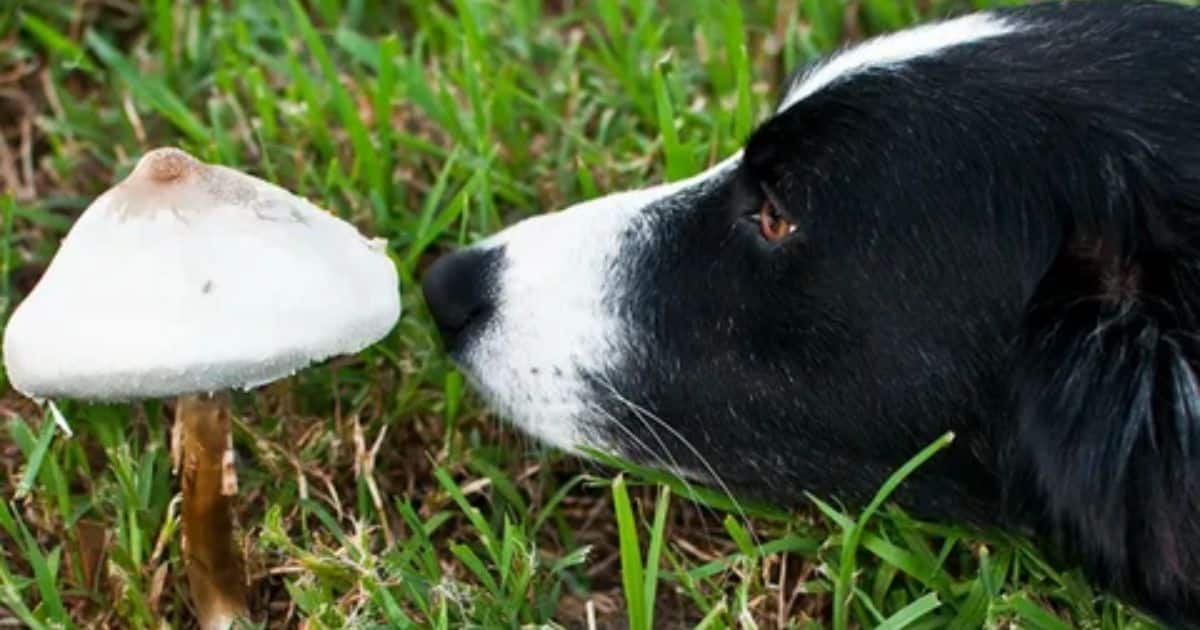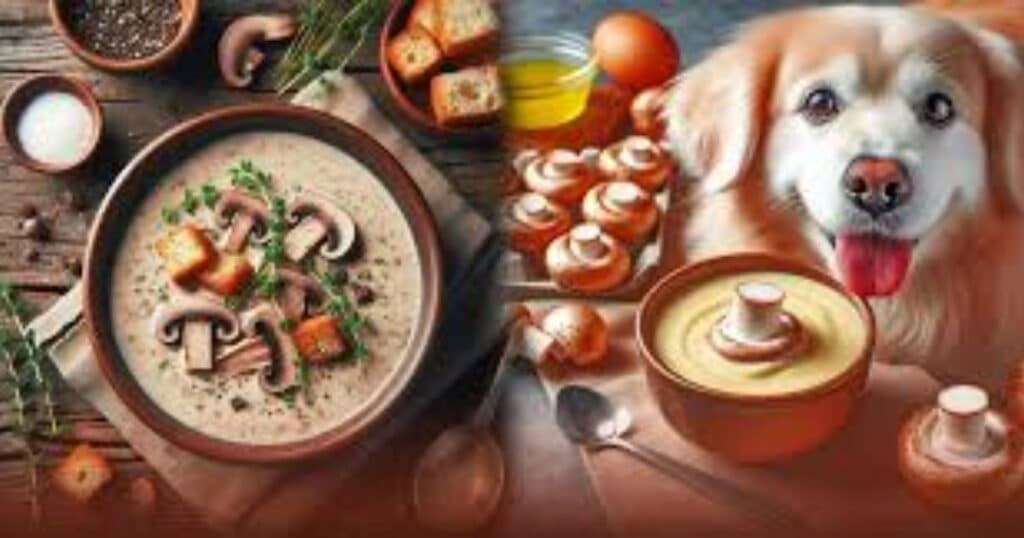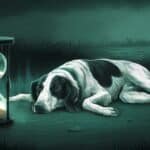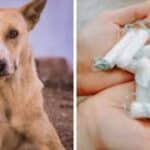As a dog owner, you’ve probably found yourself in this situation: You’re enjoying a steaming bowl of cream of mushroom soup, and suddenly, you feel those puppy eyes boring into your soul. Your furry friend is giving you that look—you know, the one—begging for just a taste of your creamy fungus dish.
But before you give in to those irresistible pleading eyes, let’s dive into the murky waters of canine mushroom consumption and uncover whether this popular soup base is a friend or foe to our four-legged companions.
Understanding the Basic Ingredients of Mushroom Soup
Common Ingredients Found in Mushroom Soup
Cream of mushroom soup is a classic comfort food, beloved by many for its rich, earthy flavors. But what exactly goes into this thick mushroom stew? Let’s break down the typical soup components:
- Mushrooms (usually button or cremini)
- Heavy cream or milk
- Onions
- Garlic
- Butter or oil
- Flour (as a thickener)
- Chicken or vegetable broth
- Salt and pepper
- Herbs (like thyme or parsley)
Now, you might be thinking, “That doesn’t sound too bad for my pup!” But hold your horses – or should I say, hold your hounds? While some of these soup ingredients might seem harmless, others can spell trouble for your canine companion.
Did you know? The first cream of mushroom soup was created in 1934 by the Campbell Soup Company. It quickly became a pantry staple and a key ingredient in countless casseroles!
READ MORE: Can Dogs Eat Salt And Vinegar Chips Safely?
Can Dogs Eat Cream of Mushroom Soup?
Potential Health Benefits of Mushroom Soup for Dogs
Before we dive into the risks, let’s look at the potential upsides of mushroom-based dog food. Mushrooms themselves can offer some nutritional benefits for dogs:
- Rich in B vitamins
- Good source of minerals like selenium and copper
- Contains antioxidants
Some pet owners have even explored fungi for pets as a way to boost their dog’s immune system. However, it’s crucial to remember that any potential benefits from mushrooms can be obtained from safer, more dog-appropriate sources.
Concerns and Risks of Mushroom Soup for Canines
Now, let’s address the elephant – or should I say, the giant mushroom – in the room. While plain, cooked mushrooms might not be inherently harmful to dogs, cream of mushroom soup comes with a host of potential issues:
- High fat content: The cream and butter in the soup can lead to pancreatitis in dogs.
- Onions and garlic: These common soup ingredients are toxic to dogs and can cause anemia.
- Salt: Most commercial soups are high in sodium, which can be harmful to dogs, especially in large amounts.
- Milk: Many dogs are lactose intolerant, which can lead to digestive upset.
- Flour: While not toxic, the flour used as a thickener can be difficult for dogs to digest.
“I once had a client whose Labrador, Max, got into a can of mushroom soup left on the counter. One innocent-looking meal led to a night of upset stomach and worried pet parents. It’s a reminder that what’s comfort food for us can be quite uncomfortable for our furry friends.” – Dr. Barker, DVM
The Danger of Wild Mushrooms and Mushroom Poison
The Differences Between Wild Mushrooms and Ingredients in Soup
While we’re on the topic of fungi, it’s crucial to distinguish between the mushrooms in your soup and those growing in your backyard. The mushrooms used in commercial soups are generally safe for human consumption, but foraged fungi and canines don’t mix!
Think of it like this: wild mushrooms are to dogs what a mystery box is to humans – exciting, but potentially dangerous! While your pup might be curious about those forest mushrooms, it’s essential to keep them away from any outdoor mushroom dangers.
| Soup Mushrooms | Wild Mushrooms |
| Cultivated | Naturally growing |
| Known species | Potentially unknown species |
| Generally safe for humans | Can be toxic to both humans and pets |
| Cleaned and processed | May contain harmful bacteria or parasites |
Treatment for Mushroom Poison in Dogs

If you suspect your dog has ingested wild mushrooms, it’s crucial to act fast. Here are the steps to take:
- Remove any remaining mushrooms from your dog’s reach.
- Collect a sample of the mushroom (if possible) for identification.
- Contact your veterinarian or animal poison control immediately.
- Watch for signs of mushroom toxicity, which can include:
- Vomiting
- Diarrhea
- Lethargy
- Yellowing of the skin (jaundice)
- Seizures
“If you suspect your dog has eaten wild mushrooms, don’t wait for symptoms to appear. Time is of the essence in treating mushroom poisoning.” –
Dr. Fungi, Veterinary Mycologist
Commercial Mushroom Soup Vs. Homemade: What’s Safer for Dogs?
Store-bought Mushroom Soup Concerns
When it comes to commercial mushroom dishes, it’s essential to be aware of the potential risks. Packaged mushroom meals often contain additional ingredients that can be harmful to dogs:
- Preservatives: These can cause allergic reactions in some dogs.
- Flavor enhancers: MSG and other additives may upset your dog’s stomach.
- Hidden onion and garlic: These might be listed as “natural flavors” but are toxic to dogs.
Tip: Always check the label! Your dog’s health is worth the extra 30 seconds it takes to review the ingredients list.
Benefits of Homemade Mushroom Soup for Dogs
If you’re dead-set on sharing some mushroomy goodness with your pup, a DIY mushroom dish might be the way to go. Here’s why a home-cooked fungus soup could be a better option:
- Control over ingredients: You can omit harmful components like onions and garlic.
- Lower sodium: You can reduce or eliminate added salt.
- Freshness: No need for preservatives or artificial flavors.
- Customization: You can tailor the recipe to your dog’s dietary needs.
Here’s a simple, dog-friendly mushroom broth recipe:
- Sauté plain, dog-safe mushrooms in a bit of olive oil.
- Add low-sodium chicken broth and simmer.
- Cool and serve in moderation as an occasional treat.
Remember, even this custom mushroom recipe should be given sparingly and only after consulting with your vet.
Can Dogs Eat Mushroom Gravy As An Alternative?
Comparing Mushroom Soup with Mushroom Gravy
You might be wondering if mushroom gravy could be a safer alternative to cream of mushroom soup. Let’s break it down:
| Aspect | Mushroom Soup | Mushroom Gravy |
| Consistency | Thick, creamy | Thinner, more liquid |
| Dairy content | Usually high | Can be lower |
| Calorie content | Generally higher | Can be lower |
| Potential for harmful ingredients | High | Still present, but can be lower |
While mushroom gravy might seem like a better option, it still comes with risks. Many gravy recipes include onions, garlic, and high amounts of salt – all of which are no-nos for dogs.
Gravy or soup? It’s like choosing between a dog’s tail wag or puppy eyes – both are tempting, but are they safe? The answer, unfortunately, is that neither is ideal for your canine companion.
Signs Your Dog May Have Reacted Badly to Mushroom Soup
If your dog has managed to sneak some mushroom soup, keep an eye out for these symptoms:
- Vomiting
- Diarrhea
- Lethargy
- Loss of appetite
- Excessive drooling
- Abdominal pain or bloating
Case Study: My Beagle, Snoopy, once got into the garbage and found leftover mushroom soup. Within hours, he was showing signs of digestive distress. A quick trip to the vet and some supportive care had him back to his usual, mischievous self in no time. But it was a stark reminder of why we need to be careful with human foods around our pets.
If you notice any of these signs, especially if they persist or worsen, it’s time to call the vet.
Prevention is Better Than Cure: When Mushroom Soup is Bad for Dogs
As the saying goes, an ounce of prevention is worth a pound of cure. Here are some tips to keep your dog safe from the perils of mushroom soup:
- Keep soup out of reach: Store leftovers in sealed containers in the fridge.
- Train your dog: Teach commands like “leave it” to prevent food snatching.
- Offer safe alternatives: Keep dog-friendly treats on hand for when you’re enjoying your soup.
- Educate family members: Make sure everyone in the household knows not to share human food with the dog.
Remember, there are plenty of safe, healthy treats you can share with your dog. Fresh vegetables like carrots or green beans can be great alternatives that satisfy your pup’s craving for human food without the risks.
Over to you
Now that we’ve stirred up all this information about the cream of mushroom soup and dogs, what are your thoughts? Have you ever been tempted to share your soup with your furry friend? Or perhaps you have a story about a dog who got into some mushroom mischief?
Remember, while we’ve covered a lot of ground here, every dog is unique. Always consult with your veterinarian before making any significant changes to your dog’s diet. They can provide personalized advice based on your pup’s specific health needs and conditions.
FAQ
Is cream of mushroom soup safe for dogs?
No, cream of mushroom soup is not safe for dogs. It often contains ingredients like onions and garlic that are toxic to dogs, as well as high levels of fat and sodium that can cause digestive issues and other health problems.
Can dogs eat cream of mushroom soup?
It’s best not to feed dogs cream of mushroom soup. While a tiny amount might not cause immediate harm, the risks outweigh any potential benefits. There are many safer, healthier treats you can offer your dog instead.
What are the potential dangers of feeding cream of mushroom soup to dogs?
The main dangers include:
- Toxicity from ingredients like onions and garlic
- Digestive upset from high fat content
- Dehydration or electrolyte imbalance from high sodium levels
- Potential allergic reactions to dairy or other ingredients
Are there any health benefits for dogs in consuming cream of mushroom soup?
While mushrooms themselves can have some nutritional benefits, these are outweighed by the risks of other ingredients in cream of mushroom soup. It’s better to find safer sources of nutrients for your dog.
What should I do if my dog accidentally ingests cream of mushroom soup?
- Don’t panic, but do act quickly.
- Try to determine how much soup your dog ate.
- Contact your veterinarian or a pet poison helpline for advice.
- Monitor your dog closely for any signs of distress or illness.
- Follow your vet’s instructions, which may include inducing vomiting or bringing your dog in for examination.
Conclusion
In conclusion, while cream of mushroom soup might be a tasty treat for humans, it’s best to keep it away from our canine companions. The potential risks—from toxic ingredients like onions and garlic to high fat and sodium content—far outweigh any nutritional benefits. Whether it’s store-bought or homemade, mushroom soup isn’t a safe choice for dogs. Instead, stick to dog-friendly treats and consult your vet for appropriate dietary choices. Remember, when it comes to your furry friend’s health, it’s always better to err on the side of caution. Your dog’s well-being is worth more than a moment of shared indulgence.
Now, it’s your turn! Share this article with fellow pet owners to spread awareness about the dangers of feeding dogs cream of mushroom soup. Together, we can ensure our furry friends stay healthy and happy. Don’t forget to consult your veterinarian for personalized advice on your dog’s diet and nutrition.
ALSO READ THIS POST: How Long Is A Few Minutes In Dog Time: Unveiling The Canine Clock

Davin Connor is an experienced author with 3 years in pets writing. Known for concise, informative content, he shares expertise on pet care, behavior, and health through his engaging articles.






